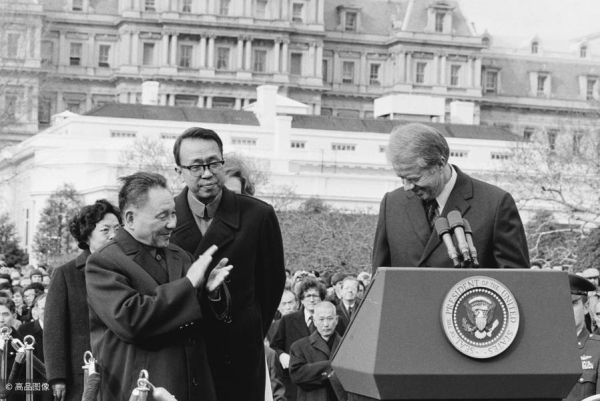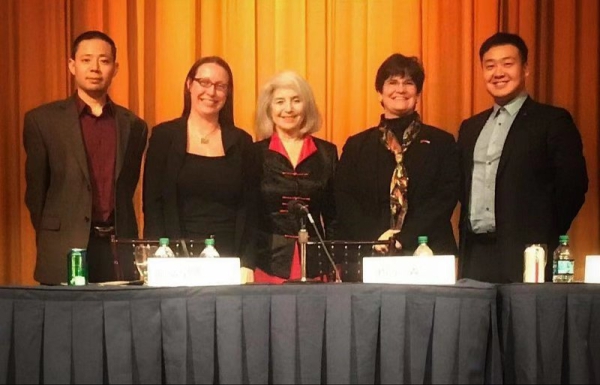Live and Let Live
-- 40 Years of China-U.S. Relations
By WANG PENG
Forty years after then U.S. President Jimmy Carter and Chinese leader Deng Xiaoping ended three decades of estrangement between the United States and the People’s Republic of China in January 1979, the Carter Center convened a three-day symposium on U.S.-China relations from January 17 to 19, 2019.

President Jimmy Carter delivers a speech, welcoming the visiting then Chinese Vice Premier Deng Xiaoping on January 29, 1979 in front of the White House.
The symposium included talks and panel discussions featuring several dozen leading scholars, think-tank experts, and veterans of statecraft, including keynote remarks on the morning of January 18 by the former U.S. President Jimmy Carter and Chinese Ambassador to the U.S. Cui Tiankai.
The symposium comes at a critical time for China-U.S. relations, which over the past half year have been marked by escalating tensions and an acrimonious trade war.
"Eat Here and We can Both Live"
It was my greatest privilege to join this conference at the Carter Center, Atlanta, and commemorate the 40th Anniversary of normalization of U.S.-China Diplomatic Relations.
Although it was not my first visit to America, each time the place and the people always offered me new thoughts and feelings about the two countries, the world, as well as the value of my work as a Chinese scholar of international relations (IR).
When my colleagues and I arrived in Atlanta, we had missed the welcome banquet, so we had to walk around the downtown area to find a lovely restaurant. Certainly, it is difficult to cater for all tastes. But when we saw a steak house named “Montana Grill” close to our hotel, I was instantly taken with it – not because of its good appearance or the enticing aroma of delicious food, but for just one sentence below the signboard, “Eat here and we can both live.”
At that moment, I was deeply moved as a vivid scene came to my mind in which an overworked father lays his eyes on me, and tries to persuade me, to the point of imploring, to come and enjoy the meal at his restaurant. His wife and children are standing by with the same expectant hope.
At that very moment, I unreservedly recommended this restaurant to my colleagues without stating my reasons explicitly. And when we enjoyed the meal, from the perspective of my professional background and work experience, I couldn’t help wondering: “Isn’t it a perfect metaphor that implicitly refers to the current situation between the U.S. and China?”
“Eat here and we can both live”, when applied to the China-U.S. relationship, may be construed in many different ways and versions, such as “buy our goods and we can both live,” or “study here and pay tuition fees, and we can both live,” and so forth.
However, all of them focus on the same spirit -- “Live and let live” -- the very essence of existential philosophy among great powers and the art of co-existence in our civilized contemporary world.
The nature of the China-U.S. relations in my view can neither be regarded as a predator-prey relationship nor a life-or-death struggle, but a long journey of co-evolution, as Dr. Kissinger also repeatedly emphasized.
As President Carter himself recently noted, the benefits that both our countries have reaped from four decades of increasing cooperation are now in jeopardy because of a deterioration of trust and respect in both capitals. Therefore, ensuring that the United States and China can continue to navigate toward collaboration on bilateral and global issues is one of the vital challenges of our time.
Co-existence and Co-evolution between China and America?

Dr. Wang Peng, together with attendees of the seminar on commemorating the 40th anniversary of the normalization of U.S.-China Relations, poses for a group picture at the Carter Center on January 18.
For practical considerations, I really appreciate former U.S. President Jimmy Carter’s advice that President Donald Trump would benefit from a few behind-the-scenes advisers who could help improve U.S. relations with China. This insight came from Carter’s personal experience during his presidency, during which he relied on an informal group of scholars, retired diplomats, and other experts for advice on U.S. relations with Japan.
The small group normally consisted of only five or six senior experts or distinguished practitioners, who enjoyed a high level of the president’s faith and confidence, offered the leaders “the need for future understanding and the avoidance of conflict between our two countries.”
President Carter fondly recalled the breakthrough with China among the top accomplishments of his presidency following an agreement that Carter and then Chinese Vice Premier Deng Xiaoping announced on December. 15, 1978, to reach which the two great nations overcame numerous difficulties both at home and abroad, and eventually normalized their diplomatic relations on January 1, 1979.
As Cui Tiankai, China’s ambassador to the U.S. stressed in his keynote speech for the Carter Center event, “It has never been so important for China and the United States to work together.” Therefore, it is safe to say that without effective action to build a new framework to manage this pivotal bilateral relationship of the world, the systemic consequences of miscalculation resulting from misunderstanding and misinterpretation can be much more serious than ever before, both regionally and globally.
Although there is not any direct mention of or plan towards a concrete resolution of the ongoing trade frictions between the two countries yet, it is time to recall the great and productive spirit of cooperation between the two countries, which was initially generated and cultivated by Deng Xiaoping, Jimmy Carter, and other first generation of builders of this bilateral relationship.
The words “Eat here and we can both live” reflect an American restaurant owner’s profound understanding of the nature of customer-business relations – they are mutually dependent and hence co-exist in a shared community indeed. Will the leaders of both sides across the Pacific Ocean share the same political wisdom and strategic vision? That is a key question to be answered.
_____________
Dr. WANG PENG is an associate research fellow at the Chongyang Institute for Financial Studies, Renmin University of China, and researcher at the Charhar Institute.